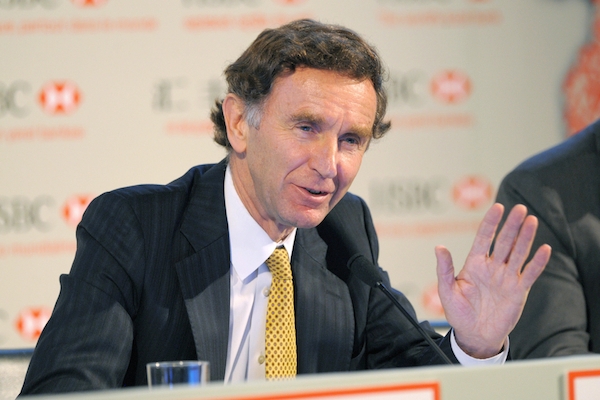Stephen Green — the former trade minister Lord Green of Hurstpier-point, who became this week’s political punchbag— was always a rather Olympian, out-of-the-ordinary figure at HSBC.
This was a bank that traditionally drew its top men from a corps of tough, non-intellectual, front-line overseas bankers typified by the chairmen before Green, Sir John Bond and Sir Willie Purves. As the dominant bank in Hong Kong and a market leader throughout Asia and the Middle East, it was habituated to dealing with customers who took big risks, hoarded cash when they had it, and did not necessarily regard paying tax as a civic duty. But if ethics were rarely discussed in HSBC dining rooms, they were robustly applied — by weeding out bad borrowers and unreliable managers, who moved on to make trouble for lesser banks seeking to compete on HSBC’s patch. That strength of grip enabled HSBC to become the world’s ‘local bank’ (a slogan it dropped in 2011) and second-largest financial colossus.
As for Green, he was a former civil servant and McKinsey consultant who arrived in his mid-thirties at HSBC headquarters in Hong Kong to do corporate planning. We might guess that he did not have many face-to-face dealings with archetypal local customers — property developers, dealers in gold and diamonds, men who made two-way prices in everything from fake handbags to taxi licences — or spend much time drinking whisky with them in Wan Chai nightclubs. But he had brains, gravitas and the high moral tone of a committed Christian who would eventually take holy orders in his spare time. The geopolitics of China’s emergence as a great economic power could have been his Mastermind special subject — and was indeed a prime reason why David Cameron later chose him as trade minister.
But for all its core strengths, outlying parts of HSBC were up to no good. In 2012, a US Senate subcommittee found that HSBC affiliates in Mexico and elsewhere had ‘exposed the US financial system to a wide array of money laundering, drug trafficking, and terrorist financing risks’. Besides channelling cash for drug cartels and suspicious Russians, HSBC was accused of circumventing sanctions on Iran and North Korea and servicing Saudi banks with jihadi links: a $1.9 billion fine followed.Stephen Green rose to take charge of HSBC’s investment and corporate banking activities, but they were never allowed to distort the balance sheet as they did at Barclays and RBS. Blame for the one strategic gambit that would come back to haunt HSBC during the financial crisis — the 2003 acquisition of the US subprime lender Household International — was never laid on Green, but on his predecessor Bond. Under Green’s hand, HSBC was the only British-based banking group with sufficient capital strength and market confidence to weather the crisis without a whisper of need for a bailout.
And even before that scandal broke, a hacked list of more than 100,000 customers of HSBC’s wealth management office in Geneva had fallen into the hands of French minister of finance Christine Lagarde, who now runs the IMF. The sums of money held were enormous, and the vast majority of non-Swiss customers were assumed to be avoiding taxes in their home domiciles. Two thousand Greek names were much bandied about as evidence of the incorrigibility of Greece — and justification for tougher bailout terms. But now it turns out that our own HMRC identified 1,100 British tax-dodging account-holders on the ‘Lagarde list’, and has so far recouped £135 million but managed to prosecute only one of them.
Cue an Albert Hall-sized chorus of indignation, led by Labour shadow ministers (ably assisted by BBC news editors) desperate to regain ground after Ed Miliband’s disastrous spat with business leaders — and despite the fact that the Geneva list dates from a period when Ed Balls was the Treasury minister watching over the banking sector. Cue also big buckets of ordure on the head of Lord Green, who has retired to the congenial post of chairman of the Natural History Museum but will no doubt now be summonsed to one of those ghastly select-committee show trials.
Let’s not mince words: Green earned a fortune at the top of HSBC, followed by a peerage, and he must answer for the failings of culture and control that have been revealed. He may have been too cerebral for such a vast command in the first place. But if there’s a note of sympathy in this account of his career, it is because I think he’s one more victim of a problem I identified long ago, in one of the first pieces I ever wrote for The Spectator, namely the perils of sheer bigness in banks that operate on a global scale.
Diversity and complexity of market risks combined with ‘fatal lack of comprehension between colleagues’, I wrote, are a formula for perpetual trouble. ‘It’s a safe piece of advice for a new chairman of a large international bank that at any given moment somebody, somewhere in your group, will be doing something utterly disastrous.’ So it was for Stephen Green, whose previously stainless reputation is unlikely to recover.
This is an extract from Martin Vander Weyer’s column in this week’s Spectator.







Comments